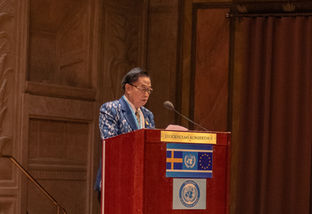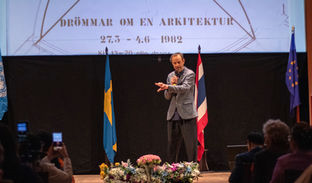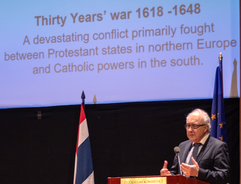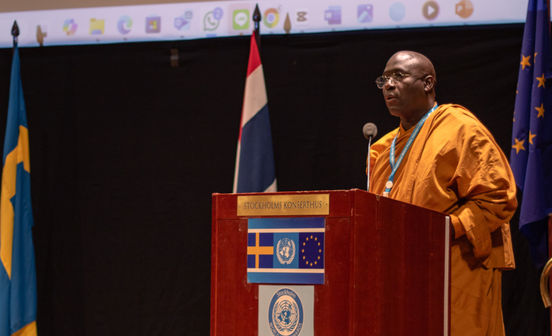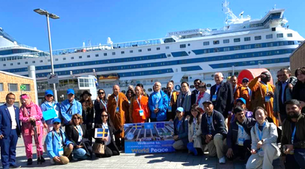

Event summary
Ambassador Dr. Palitha Kohona
Report from the 6th World Peace Award Conference
The 6th World Peace Award Conference, held in Stockholm from May 24 to 28, 2025, celebrated human fellowship and the pursuit of peace. The event welcomed individuals concerned about peace and human development. Amid global challenges, the conference emphasized that solutions emerge when humanity collaborates, sharing common perspectives and interests. Central to this collaboration was the exploration of universally shared values, with participants contributing to this vision.
The conference was a resounding success at the world-renowned Stockholm Concert Hall, a venue known for hosting events like Nobel Prize ceremonies and classical performances. More than 200 passionate peace advocates and cultural leaders joined us, fostering meaningful exchanges and connections.
Participants were educators, researchers, human rights activists, members of religious organizations, and artists dedicated to empowering people and strengthening democracy by countering violence and hatred were encouraged to share their visions and learn from others. The event provided a valuable opportunity to network and inspire hope by exchanging experiences and knowledge.
Theme: Peace, Civil Society, and the Environment
Peace, a concern for all, was highlighted as more than a political agenda—it is a human agenda. The conference underscored that peace begins with understanding and a willingness to learn from one another.
Discussions focused on three key areas: the concept of peace in relation to the UN Declaration on a Culture of Peace, the role and responsibility of civil society, including religious groups, youth, and cultural organisations, in contributing to peace, and the pressing issues of the environment and climate. It was emphasized that saving the planet requires collective action and solidarity. Moreover, the environment was discussed not only in ecological terms but also as something humans collectively shape within society. The multifaceted nature of peace, encompassing all aspects of human life, was a central theme.
The Importance of Universally Shared Values
The conference addressed the growing mistrust and division in an increasingly integrated world. While religion has historically been a driving force in civilizations, it has often been marginalized or blamed for conflicts in the modern era. However, conflicts persist with or without religious influence. Political polarization, social confrontations, and rising nationalism were also discussed as challenges to peace.
The challenge lies in finding a model for peace that transcends religious, political, social, and national interests. Recognizing universally shared values was proposed as a solution. Such recognition enables religious individuals to engage in deeper dialogue, guides politicians toward greater responsibility, and encourages social activists to seek constructive solutions beyond opposition. A healthy society is built on mutual trust and care, allowing for the retention of unique identities while acknowledging our shared humanity. Successful dialogue requires acknowledging the values we all share. This focus on exploring universally shared values aimed to contribute to a peaceful world and offer hope for humanity’s future.
What’s Next
• Comments and your report are welcome. Stay tuned for more.
• Interested in contributing or attending the next event? Get in touch [link to contact page].
Mark your calendars: The next World Peace Award Conference will be held in Stockholm in August 2026 — stay tuned for specific dates, venue, and program details.
Highlights from the Conference
Lorenz Jolin from the WPA Organising Committee opened the event and presented the distinguished speakers:
• Prof. Nagaris (Afghanistan)
• Prof. Dr. Arsen Gvenetadze, Ambassador of Peace and Happiness (Georgia)
• Venerable Dr. Kaboggoza Buddharakkhita (Uganda)
• Dr. Thitiwat Adisornphankul (Thailand)
• Imam Awad Olwan
• Kaj Engelhart
Their diverse insights set the tone for a rich exchange of perspectives.
Presenting Art as a Pathway to Understanding
Artists Torgny Larsson, Papa Jammeh Ousmann, Ingela Hageman, and Master Amnat Opaso Klanpraracha showcased projects that demonstrated art’s unique ability to foster empathy and bridge cultural divides, often communicating subtleties that words cannot.
After the break, the session resumed with:
MC Ingela Karlsson, who welcomed attendees with original poetry
Interfaith Prayers for Global Peace
Remarks by Key Figures: Phramaha Boonthin Taosiri, Chairman of WPA. Hon. Niyom Wechkama, Vice Minister, Office of the Prime Minister, Thailand, Phra Kru Bai-Dee-gar Amnat Klanpracha
These moments emphasised the event’s spiritual and inclusive dimensions.
The evening featured a vibrant mix of performances: Caroline Williams (vocals) and Martin Ekström (guitar). Students from Georgia, presenting a traditional dance. Fanny & Friends, culminating with the moving rendition of “I Shall Be Released”
World Peace Award Recipients
The following distinguished individuals were honored with the World Peace Award:
1. Dr Palitha Kohona
A senior diplomat with extensive experience at the highest levels in Sri Lanka, the United Nations, and Australia.
2. Prof Dr Arsen Gvenetadze
Ambassador of Peace and Happiness (Georgia)
3. Venerable Dr Kaboggoza Buddharakkhita
Renowned spiritual leader from Uganda
4. Venerable Master Amnat Opaso Klanpraracha
Esteemed Buddhist Master
Peace Ambassador Diplomas Awarded To
In recognition of their commitment to peace, the following individuals received Peace Ambassador diplomas:
Dr Dikpal K. Baidya – Canada, Ven. Bhadhant Dhammnag – India, Rathchaphol Suwannachot – Thailand, Saba Zakaraia – Georgia, Martin Kweku – Ghana, Dr Supapan Permpool – Thailand, Manoj Divituragama – Sri Lanka, Artidtiya Phasuthalerd – Thailand, Pittara Navarat – Thailand
These honours recognise their outstanding contributions and ongoing dedication to fostering peace and understanding across nations and cultures.
World Peace Declaration
The conference provided a World Peace Declaration. Se below.

Buddhist munks pray for the event
Pramathin Boonthin Taosiri
Chairman of WPA committee


Martin Ekström & Caroline Williams

Fanny and friends singing the peace song: I Shall be Released
Photos Jeanette Jolin
Stockholm consert hall

Dr. Piya Rattna,World Peace Award organizing Committee

Students from Georgia perform a traditional dance

Master of Ceremonies:
Ingela Karlsson

Kaj Engelhart, Catholic Church

Imam Awad Olwan

Welcome, greetings from the Chairman
Honourable Ministers, Ambassadors, Distinguished Guests,
Welcome to the World Peace Award Ceremony at the Stockholm Concert Hall. The organizing committee is deeply honoured to have the opportunity to welcome all of you from around the world to this prestigious venue.
The Stockholm Concert Hall is renowned as a location for hosting globally significant events.
Most importantly, it is the venue for the annual Nobel Prize Award Ceremony.
The organizing committee would like to express our sincere gratitude to the Stockholm Concert Hall, the Embassy of Sweden, the Government of Sweden, the Government of Thailand, the Thai Embassy, and all sponsors and supporters who have made this event a great success.
We hope that all of you who have travelled from across the globe will have the opportunity to witness and enjoy the beauty of Sweden and Finland—two countries recognized for their peace, cleanliness, and natural beauty, among the most admirable countries in the world.
On this occasion, we would like to extend our congratulations to all recipients of this year’s World Peace Award and all peace-related honours.
Finally, I would like to ask everyone to join together in a collective prayer of loving-kindness, extending goodwill to every corner of the world where people are suffering from disasters, whether due to conflict or natural causes, that have brought loss of life, separation from loved ones, and property damage.
May the power of our collective prayer today serve as a force for sustainable peace and lasting harmony in our world.
With deepest gratitude.

Venerable Phravitedpunyaporn
Dr. Phramaha Boonthin Taosiri
Chairman, World Peace Award organizing Committee,
Vice President, The Union of Thai Sanghas in Europe


Dr. Arsen Gvenetadz
Go here on Youtube to see Dr.Gvenetadz work
Professor Nagaris
Venerable Dr. Kaboggoza Buddharakkhita
Papa J Ousmann
Ingela Hagman
Ingela Hagman artwork
Torgny Larsson
Lorenz Jolin,
World Peace Award organizing Committee
Photos Jeanette Jolin
Photo by Jeanette Jolin





World Peace Declaration – Stockholm
Issued by the Ambassadors of Peace and World Peace Award Laureates, 27th May 2025
Declaration of Commitment by Ambassadors of Peace and World Peace Award Laureates
We, the undersigned Ambassadors of Peace and recipients of the World Peace Award, reaffirm our collective dedication to fostering a more peaceful world. Guided by universally shared values and inspired by global declarations promoting a culture of peace, we commit to the following principles:
1. Practicing Faith, Peace, and Love
We pledge to uphold these core virtues—faith, peace, and love—as foundations for unity, compassion, and global harmony.
2. Eliminating Violence and Conflict
We are committed to eradicating violence and conflict at every level: within ourselves, our communities, our nations, and across the world.
3. Embracing Diversity
We recognize and honor differences in gender, nationality, religion, and socio-economic background. Rather than divide us, these differences enrich our shared humanity and strengthen our bonds.
4. Empowering the Next Generation
We commit to engaging and empowering youth to actively participate in peacebuilding forums and leadership, fostering a new generation of peace advocates.
5. Supporting Vulnerable Populations
We dedicate ourselves to a global movement for peace that prioritises care for the most vulnerable—especially children—ensuring their safety, dignity, and well-being.
6. Harnessing the Arts and Creative Modalities
We will use the transformative power of education, art, music, dance, meditation, prayer, and other creative practices to inspire peace and promote healing across all communities.
7. Cultivating Compassion for All Beings
May all beings be free from suffering and its causes.
May all beings be well, happy, and at peace.
8. Promoting a Culture of Peace
We seek to cultivate a culture of peace that transcends cultural, political, and religious boundaries—founded on universal values, mutual respect, and shared benefit.
International delegetes outside Stockholm CIty Hall
The following participants sign this declaration:
Ven. Bhante Dr. Kaboggoza Buddharakkhita, Abbot and President of the Uganda Buddhist Centre. Ven. Mahaphra Dr. Boonthin Taosori, Chairman of the World Peace Award in Sweden, Mr . Priya , World of the World Peace Award in Sweden, Dr. Tamar Lolishvili, Prof. Arsen Gvenetadze, Prof. Nargis Mommand Hassanzai

On the cruise to Helsinki



